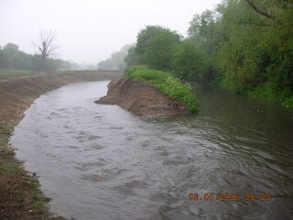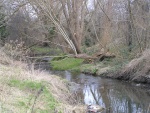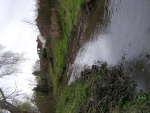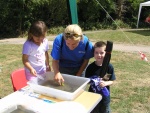Case study:River Hogsmill Restoration Project: Difference between revisions
No edit summary |
No edit summary |
||
| (14 intermediate revisions by 2 users not shown) | |||
| Line 7: | Line 7: | ||
{{Project overview | {{Project overview | ||
|Status=Complete | |Status=Complete | ||
|Themes=Flood risk management, Habitat and biodiversity, Hydromorphology | |Themes=Flood risk management, Habitat and biodiversity, Hydromorphology, Urban | ||
|Country=England | |Country=England | ||
|Main contact forename=Toni | |Main contact forename=Toni | ||
| Line 14: | Line 14: | ||
|Contact organisation=Environment Agency | |Contact organisation=Environment Agency | ||
|Contact organisation url=www.epsom-ewell.gov.uk/EEBC/ | |Contact organisation url=www.epsom-ewell.gov.uk/EEBC/ | ||
|Partner organisations=Epsom & Ewell Borough Council, Rosebery Housing Association, | |Partner organisations=Epsom & Ewell Borough Council, Rosebery Housing Association, Environment Agency, the Countryside Agency, the Big Lottery Fund, Surrey County Council, | ||
|Multi-site=No | |Multi-site=No | ||
|Project picture=Hogsmill in flood.jpg | |Project picture=Hogsmill in flood.jpg | ||
| Line 37: | Line 37: | ||
The Hogsmill River is an important wildlife refuge and has great recreational value, but was perceived by many as run down and a shadow of its former self. In places it was steep-sided, concrete-lined, crossed by service pipes and strewn with litter. Despite this, the river which originates as a chalk stream in Ewell still provides a home to fish such as stone loach, minnows and bullhead and if nature lovers are lucky, they can see one of the kingfishers which live along the river. | The Hogsmill River is an important wildlife refuge and has great recreational value, but was perceived by many as run down and a shadow of its former self. In places it was steep-sided, concrete-lined, crossed by service pipes and strewn with litter. Despite this, the river which originates as a chalk stream in Ewell still provides a home to fish such as stone loach, minnows and bullhead and if nature lovers are lucky, they can see one of the kingfishers which live along the river. | ||
The Environment Agency has contributed £130,000 to restore the river and make it a more visible and accessible area for local residents to enjoy with improvements for wildlife and flood defenses. | The Environment Agency has contributed £130,000 to restore the river and make it a more visible and accessible area for local residents to enjoy with improvements for wildlife and flood defenses. | ||
|Monitoring surveys and results=The benefits of the Environment Agency river restoration work include: | |||
The benefits of the Environment Agency river restoration work include: | |||
*An improved river that will attract new wildlife and become a focal point of interest for the local community and which can be used by local schools as an educational resource. | *An improved river that will attract new wildlife and become a focal point of interest for the local community and which can be used by local schools as an educational resource. | ||
| Line 47: | Line 46: | ||
*Planting of a wildflower meadow, connecting the existing grassland habitats within the river valley to provide benefits for wildlife and especially butterflies. | *Planting of a wildflower meadow, connecting the existing grassland habitats within the river valley to provide benefits for wildlife and especially butterflies. | ||
*Cutting back trees in the existing woodland, allowing light in for other plant life to grow diversifying the habitat and supporting more animals such as dragonflies. | *Cutting back trees in the existing woodland, allowing light in for other plant life to grow diversifying the habitat and supporting more animals such as dragonflies. | ||
*Local reaction to the improvements has been very positive | *Local reaction to the improvements has been very positive | ||
| Line 69: | Line 67: | ||
|File name=The River Hogsmill at Watersedge - October 2009.JPG | |File name=The River Hogsmill at Watersedge - October 2009.JPG | ||
|Caption=The River Hogsmill at Watersedge - October 2009 | |Caption=The River Hogsmill at Watersedge - October 2009 | ||
}} | |||
{{Case study image | |||
|File name=4.jpg | |||
|Caption=backwater created by remeander of river | |||
}} | |||
{{Case study image | |||
|File name=10b.jpg | |||
|Caption=view from a bridge | |||
}} | |||
{{Case study image | |||
|File name=P3220234.JPG | |||
|Caption=kingfisher branch | |||
}} | |||
{{Case study image | |||
|File name=P3220227.JPG | |||
|Caption=view upstream | |||
}} | |||
{{Case study image | |||
|File name=P3300268.JPG | |||
|Caption=upstream photo | |||
}} | |||
{{Case study image | |||
|File name=P7300635.JPG | |||
|Caption=openning day | |||
}} | }} | ||
{{Image gallery end}} | {{Image gallery end}} | ||
| Line 78: | Line 100: | ||
{{Site | {{Site | ||
|Name=Hogsmill | |Name=Hogsmill | ||
|WFD water body code=GB106039017440 | |||
|WFD water body name=Hogsmill | |||
|Reference morphology=Actively meandering | |Reference morphology=Actively meandering | ||
|Heavily modified water body=No | |Heavily modified water body=No | ||
| Line 83: | Line 107: | ||
|Protected species present=No | |Protected species present=No | ||
|Invasive species present=No | |Invasive species present=No | ||
|Species=kingfisher (Alcedo atthis), bullhead (Cottus gobio), minnow, stone loach | |||
|River corridor land use=Parklands garden, | |||
}} | }} | ||
{{Project background | {{Project background | ||
| Line 89: | Line 115: | ||
|Total1 cost=130,000 | |Total1 cost=130,000 | ||
|Funding sources=Environment Agency, | |Funding sources=Environment Agency, | ||
|Supplementary funding information=The Environment Agency has contributed £130,000 | |||
total cost estimates: | |||
*Item Base Cost Budget Cost | |||
*General Clearance £47,200 £56,640 | |||
*Tree Works £16,000 £19,200 | |||
*LB Re-profiling £18,900 £22,680 | |||
*RB Top of Bank Re-profiling £8,600 £10,320 | |||
*RB Low Level Footpaths Re-profiling £9,500 £11,400 | |||
*Wildlife Pond £18,100 £21,720 | |||
*New River Meander £24,500 £29,400 | |||
*New Backwater £12,000 £14,400 | |||
*Footpaths (tarmac or similar) – 450m £24,200 £29,040 | |||
*Footpaths (gravel or similar) - 1930m £44,800 £53,760 | |||
*Kingston Station Footpath - 200m £44,800 £53,760 | |||
*Bonesgate Stream Curved Bridge £24,200 £29,040 | |||
*Playground Bridge £23,600 £28,320 | |||
*Picnic Area £2,900 £3,480 | |||
*Lighting £7,000 £8,400 | |||
*General Planting £10,000 £12,000 | |||
Subtotal £403,560 | |||
Design and contract administration 15.0% £26,606 | |||
Overheads and profit 12.5% £22,172 | |||
Adjustment -7.5% -£13,303 | |||
Total (rounded up) £440,000 | |||
}} | |||
{{Motivations | |||
|Specific mitigation=Flood risk management, | |||
|Other motivation=improving a local park | |||
}} | }} | ||
{{Measures | {{Measures | ||
|Floodplain / River corridor=Planting | |Floodplain / River corridor=Planting, Habitat enhancement, Tree management, Cut back of trees, | ||
|Planform / Channel pattern=Creation of meanders, | |Planform / Channel pattern=Creation of meanders, Creation of wooden deflectors, Creation of an island | ||
|Social measures=Restoration of a footbridge | |Social measures=Restoration of a footbridge | ||
}} | }} | ||
| Line 107: | Line 163: | ||
{{Monitoring documents end}} | {{Monitoring documents end}} | ||
{{Additional Documents}} | {{Additional Documents}} | ||
{{Case study documents | |||
|File name=Hogsmill HLF Approach 2005.doc | |||
|Description=Hogsmill proposal | |||
}} | |||
{{Case study documents | |||
|File name=Hogsmill Feasibility Report (Draft) 2 no photos.doc | |||
|Description=feasibility report | |||
}} | |||
{{Additional Documents end}} | {{Additional Documents end}} | ||
{{Additional links and references header}} | {{Additional links and references header}} | ||
Latest revision as of 12:04, 6 June 2017
Project overview
| Status | Complete |
|---|---|
| Project web site | |
| Themes | Flood risk management, Habitat and biodiversity, Hydromorphology, Urban |
| Country | England |
| Main contact forename | Toni |
| Main contact surname | Scarr |
| Main contact user ID | User:Ascarr |
| Contact organisation | Environment Agency |
| Contact organisation web site | http://www.epsom-ewell.gov.uk/EEBC/ |
| Partner organisations | Epsom & Ewell Borough Council, Rosebery Housing Association, Environment Agency, the Countryside Agency, the Big Lottery Fund, Surrey County Council |
| Parent multi-site project | |
| This is a parent project encompassing the following projects |
No |
Project summary
River Hogsmill restoration project
Creating a better place to live Reference:SRB06/PR080 Better living place
Completion: 20th July 2006
The completion of a £230,000 improvement project on a section of the Hogsmill Open Space and river near the Watersedge Housing Estate in Epsom and Ewell, has been achieved due to a highly successful partnership.
Local residents teamed up with Epsom & Ewell Borough Council, Rosebery Housing Association, the Environment Agency, the Countryside Agency, the Big Lottery Fund, Surrey County Council, the Royal Borough of Kingston and the Lower Mole Countryside Management Project to achieve the most dramatic and positive results! The project has given a new lease of life to the site delivering improved access, with new paths, a new footbridge and a better environment for wildlife through flood defence improvements to the Hogsmill River.
But the project is not a recent innovation, in 2001 local residents were asked what improvements they would most like to see regarding their local environment and a strong message came back that people wanted improved access along the Hogsmill Open Space and across the Bonesgate Stream. Rosebery Housing Association and the Watersedge Action Group approached Epsom & Ewell Borough Council and the Environment Agency and the Hogsmill Improvement Project was born. This quickly led to the inclusion of other partners and the formation of the ‘Friends of the Hogsmill’; and it was soon realized that such a large area of open space needed many stakeholders who could all contribute – and that’s just what they all did!
To improve access and to ensure good community involvement the Countryside Agency were approached and a successful application for ‘Doorstep Green’ status was made. This resulted in a ‘Big Lottery Fund’ grant of up to £55,000 which has allowed for the construction of a new path running along the whole length of the site with new entrances and seats along the route.
A new Footbridge to replace the existing unsafe stepping stones across the Bonesgate Stream has been purchased using £25,000 of funds awarded by the ‘Living Spaces’ Lottery fund and is due for installation later this month. A culvert and new section of path linking the site of the new bridge to the Watersedge Estate has already been constructed by volunteers from the Lower Mole Countryside Management Project.
The Hogsmill River is an important wildlife refuge and has great recreational value, but was perceived by many as run down and a shadow of its former self. In places it was steep-sided, concrete-lined, crossed by service pipes and strewn with litter. Despite this, the river which originates as a chalk stream in Ewell still provides a home to fish such as stone loach, minnows and bullhead and if nature lovers are lucky, they can see one of the kingfishers which live along the river.
The Environment Agency has contributed £130,000 to restore the river and make it a more visible and accessible area for local residents to enjoy with improvements for wildlife and flood defenses.
Monitoring surveys and results
The benefits of the Environment Agency river restoration work include:
- An improved river that will attract new wildlife and become a focal point of interest for the local community and which can be used by local schools as an educational resource.
- Creation of a meander and backwater in a previously straightened river, which will improve the habitat for fish.
- The concrete bed protection on the Bonesgate Stream has been removed which will improve the appearance of the river and the local environment for wildlife.
- A restored footbridge to complement the adjacent new footbridge and ensuring continued safe access for residents, including wheelchairs and pushchairs.
- Planting of a wildflower meadow, connecting the existing grassland habitats within the river valley to provide benefits for wildlife and especially butterflies.
- Cutting back trees in the existing woodland, allowing light in for other plant life to grow diversifying the habitat and supporting more animals such as dragonflies.
- Local reaction to the improvements has been very positive
The Hogsmill River is an important wildlife refuge and has great recreational value, but was perceived by many as run down and a shadow of its former self. In places it was steep-sided, concrete-lined, crossed by service pipes and strewn with litter. Despite this, the river which originates as a chalk stream in Ewell still provides a home to fish such as stone loach, minnows and bullhead and if nature lovers are lucky, they can see one of the kingfishers which live along the river.
The Environment Agency has contributed to this project to restore the river and make it a more visible and accessible area for local residents to enjoy with improvements for wildlife and flood defenses.
The benefits of the Environment Agency river restoration work include: an improved river that will attract new wildlife and become a focal point of interest for the local community and which can be used by local schools as an educational resource; creation of a meander and backwater in a previously straightened river, which will improve the habitat for fish; the concrete bed protection on the Bonesgate Stream has been removed which will improve the appearance of the river and the local environment for wildlife; a restored footbridge to complement the adjacent new footbridge and ensuring continued safe access for residents, including wheelchairs and pushchairs; planting of a wildflower meadow, connecting the existing grassland habitats within the river valley to provide benefits for wildlife and especially butterflies; cutting back trees in the existing woodland, allowing light in for other plant life to grow diversifying the habitat and supporting more animals such as dragonflies.
Lessons learnt
Image gallery
|
Catchment and subcatchmentSelect a catchment/subcatchment
Catchment
Subcatchment
Other case studies in this subcatchment: Bonesgate Phase 2, Elmbridge Meadows, Hogsmill River Connectivity Project, Hogsmill Sewage Treatment Works phase 1, Moor Lane Allotments, Three Bridge, Kingston
Site
Project background
Cost for project phases
Supplementary funding informationThe Environment Agency has contributed £130,000 total cost estimates:
Subtotal £403,560 Design and contract administration 15.0% £26,606 Overheads and profit 12.5% £22,172 Adjustment -7.5% -£13,303 Total (rounded up) £440,000
Reasons for river restoration
Measures
MonitoringHydromorphological quality elements
Biological quality elements
Physico-chemical quality elements
Any other monitoring, e.g. social, economic
Monitoring documents
Additional documents and videos
Additional links and references
Supplementary InformationEdit Supplementary Information
| ||||||||||||||||||||||||||||||||||||||||||||||||||||||||||||||||||||||||||||||||||||||||||||||||||||||||||||||||||||||||||||||||||||||||||||||||||||||||||||||||||||||||||||||||||||||||||||||||||||||||










